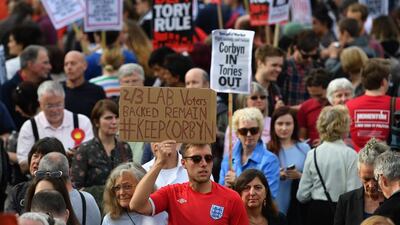After a historical moment, the historical analogies arrive. In reaching for a way to explain the far-reaching consequences of Britain's vote to leave the European Union, the Arab Spring has repeatedly been invoked.
Perhaps unsurprisingly, as it is tempting to see last week's vote as the moment the "British street" finally had enough and rose up against an unelected regime – with disastrous consequences.
The Arab Spring analogy holds attractions for both sides, those who voted to leave the EU and those who voted to remain.
For Leavers, the vote was a revolutionary moment, when ordinary people stood up against the establishment and took their power back.
For Remainers, these revolutionaries unnecessarily demonised the existing order, shattering a functional if imperfect system with no real plan in place for what would come next. Both, of course, expect the old order to battle to restore itself, as it did in the Arab Spring countries.
There are, in fact, parallels between Brexit and the Arab Spring, though the comparison can be overdone. But most comparisons are imperfect because they either misrepresent what the Arab Spring was, or what the Brexit vote is.
Start with the leadership. Far from being a spontaneous uprising, as the Arab Spring revolutions in Tunisia, Egypt, Yemen, Libya and Syria were, the Brexit vote was a carefully planned, well-led political movement.
In fact, the crucial difference between the two is that the political leadership of the Arab Spring came after the revolutions, not before.
In the aftermath of the revolutions, Ennahda in Tunisia, the Muslim Brotherhood in Egypt and the various groups in Libya and Yemen jockeying for position emerged. But they did not lead the protesters. The Arab Spring was a revolution in need of leadership, while the Brexit debate was a political question that later found mass acceptance.
That makes the argument that both sets of “revolutionaries” ought to have had a plan in place irrelevant. The Arab Spring protesters could not have had a plan in place – because no one could have foreseen that the spontaneous uprising against a regime would work and would bring down the system.
By contrast, the Leave campaign in the UK had months, even years, to prepare a detailed plan for what might happen after, and did not.
It is certainly true that both the Leave vote and the Arab Spring set in motion forces that could not be contained – and that some involved in both events came to regret their outcomes. But in the case of the Arab Spring that cannot be blamed on the protesters, because the demonstrations were initially leaderless.
Where there is a parallel between the two events, it is this. In both the Arab republics and the UK, successive governments ignored the periphery in favour of the heartland. When those who were excluded finally saw a chance to overthrow the system that had harmed them, they took it, regardless of the consequences.
Where the “heartland” and “periphery” were located varied: in Egypt, the heartland was the political and military elite; in Syria, it was an Alawite core, surrounded by Sunni Muslim and Christian supporters. In the UK, the “periphery” was working-class Labour supporters and middle-class Conservative supporters, both of whom had their concerns minimised and ignored over many years.
The reason the Arab republics had mass uprisings was that the “periphery”, the number of people ignored and marginalised by the regimes, was enormous, vast constituencies of the population.
(This analogy, of course, only applies before the Arab uprisings turned violent. Once the regimes used the forces of the state against the bodies of the protesters, the uprisings turned armed and violent – as, certainly in Syria, the state violence was designed to ensure that they did.)
In some ways, it can seem flippant to compare the two. The UK has just had the largest democratic exercise in its history. The vote to Leave is a revolution in name only. The Arab Spring uprisings are, on the other hand, true revolutions – unpredictable attempts to overthrow regimes, with brutal responses.
Yet both events will have vast consequences. Just as the Arab Spring affected the Middle East and then Europe, so any collapse of the European project will very swiftly find its way to the Middle East.
If the Arab Spring demonstrated anything, it is that countries are too intimately connected for political troubles to be demarcated by borders. Despite what some of those who voted Leave seem to think, problems on one part of a continent inevitably find their way to another – no matter how high the walls are built.
falyafai@thenational.ae
On Twitter: @FaisalAlYafai


